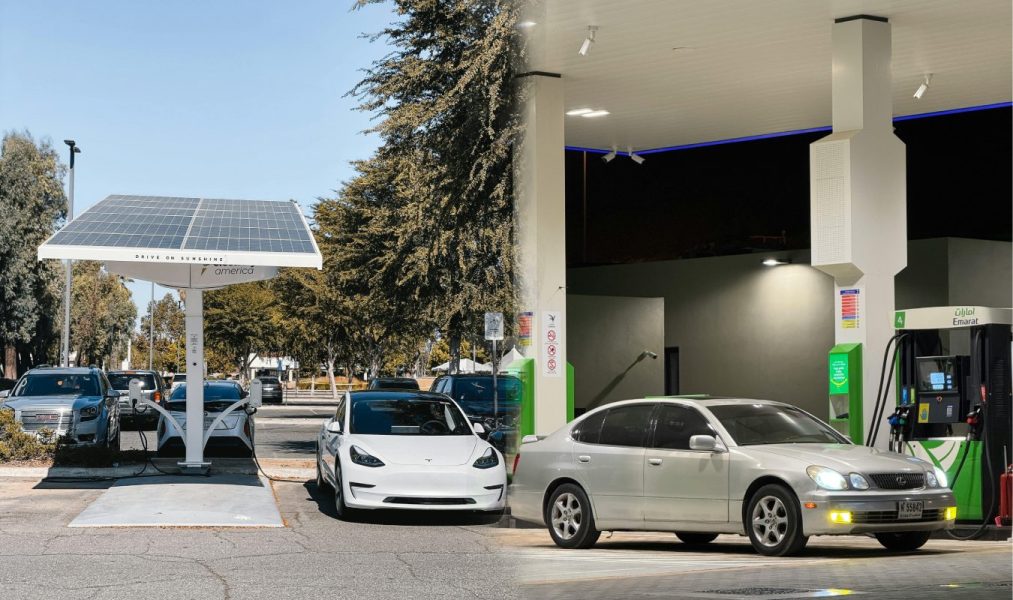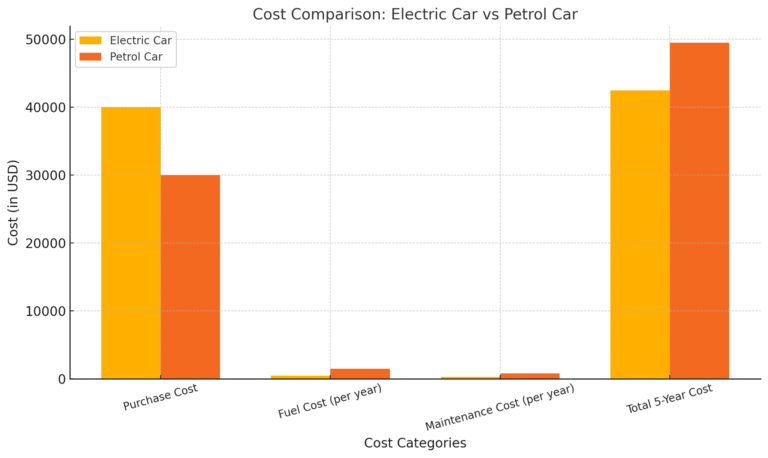Electric vs Petrol Cars: Which Will Dominate Your Wallet and the Planet?
The automotive world stands at a pivotal moment. With escalating climate concerns and rapid technological innovation, the competition between electric and petrol vehicles has never been more intense. This guide cuts through the complexity, offering a clear-eyed look at both technologies to help you make an informed choice that impacts your finances and the planet.

Financial Landscape: Crunching the Numbers
Upfront Investment
- Petrol Cars: The Traditional Budget Option
- Lower initial purchase price
- Established market with extensive model choices
- A mature manufacturing process keeps costs down
- Lower initial purchase price
- Electric Cars: The Strategic Investment
- Higher initial price tag
- Rapidly declining costs
- Government incentives can significantly offset purchase expenses
Running Costs: The Long-Term Picture
Fuel Expenses
- Petrol Cars:
- Unpredictable fuel prices
- Annual fuel costs typically range from $1,500 to $2,500
- Vulnerability to global oil market fluctuations
- Unpredictable fuel prices
2. Electric Cars:
- Substantially lower charging expenses
- Annual electricity costs around $500 to $700
- Flexibility of home charging and off-peak electricity rates
- Substantially lower charging expenses
Maintenance Realities
- Petrol Cars:
- More complex maintenance requirements
- Regular oil changes and multiple mechanical systems
- Typical annual maintenance: $800 to $1,200
- More complex maintenance requirements
2. Electric Cars:
- Dramatically simplified maintenance
- Minimal moving parts
- No oil change needs
- Annual maintenance costs: $300 to $500
- Dramatically simplified maintenance

Environmental Footprint: Beyond the Tailpipe
Carbon Emissions
- Petrol Cars:
- Direct and continuous carbon output
- Significant greenhouse gas contributor
- Approximately 4.6 metric tons of CO2 annually
- Direct and continuous carbon output
2. Electric Cars:
- Zero direct emissions
- Carbon impact depends on electricity generation
- Potential for near-zero emissions with renewable energy sources
Lifecycle Considerations
- Electric Cars:
- Battery production poses environmental challenges
- Advancing recycling technologies
- Emerging second-life battery applications
- Battery production poses environmental challenges
2. Petrol Cars:
- Persistent environmental impact
- Limited recycling opportunities
- Continued reliance on fossil fuel extraction
- Persistent environmental impact
Performance and Practicality: Real-World Insights
Range and Mobility
- Petrol Cars:
- Extensive existing infrastructure
- Proven long-distance capabilities
- Instant refueling convenience
- Extensive existing infrastructure
- Electric Cars:
- Rapidly improving battery technology
- Expanding driving ranges (250-400 miles per charge)
- Growing charging network
- Rapidly improving battery technology
Refueling vs. Charging
- Petrol Cars:
- Quick 5-10 minute refueling
- Widespread fuel station network
- Quick 5-10 minute refueling
2. Electric Cars:
- Charging times vary (30 minutes to 8 hours)
- Expanding charging infrastructure
- Home charging adds convenience
- Charging times vary (30 minutes to 8 hours)
Industry Horizon: What’s Coming Next
Market Dynamics
- Electric vehicle sales accelerating (40% annual growth)
- Major manufacturers committing to electric transitions
- Increasing government support and regulations
Technological Evolution
- Breakthrough battery innovations
- Falling production costs
- Extended driving ranges
- Faster charging technologies
Making Your Choice: Personalized Insights
Petrol Might Be Your Match If:
- Charging infrastructure is limited in your area
- Long road trips are a regular part of your lifestyle
- Upfront costs are your primary concern
- You lack reliable home or work charging options
Electric Could Be Your Ideal Option If:
- Environmental impact matters deeply to you
- Home charging is readily accessible
- Long-term cost savings are attractive
- You primarily drive in urban environments
Whether you’re always charging at home or on the go, Tayniu’s charging solutions are online to help you out. Get in touch now!
The Road Ahead
The electric versus petrol debate isn’t about declaring a definitive winner but finding the right solution for your unique needs. As technology advances, electric vehicles become increasingly compelling, promising a cleaner, more efficient transportation future.
Key Insight: Your ideal choice depends on personal driving habits, local infrastructure, and individual priorities. The automotive landscape is transforming rapidly, and today’s decision shapes tomorrow’s mobility.
While electric vehicles are gaining ground, petrol cars won’t vanish overnight. Expect a gradual, nuanced transition that gives consumers time to adapt and explore new technologies.
Stay informed, remain flexible, and choose the vehicle that best aligns with your lifestyle and values.
Note: Prices and statistics are approximate and may vary based on location, specific models, and current market conditions.
References:
- International Energy Agency (IEA) – Electric Vehicle Outlook
- U.S. Department of Energy – Alternative Fuels Data Center
- Bloomberg New Energy Finance (BNEF) – Electric Vehicle Forecast
- International Council on Clean Transportation (ICCT)
- EPA – Greenhouse Gas Emissions from a Typical Passenger Vehicle
- Consumer Reports – Electric Vehicle Buying Guide
- McKinsey & Company – Electric Vehicle Insights
- U.S. Department of Transportation – Alternative Fuel Vehicles
- European Alternative Fuels Observatory
Disclaimer: Links are current as of publication date. Always verify the most recent sources for the most up-to-date information.
Last Updated on December 10, 2024 by tayniu
